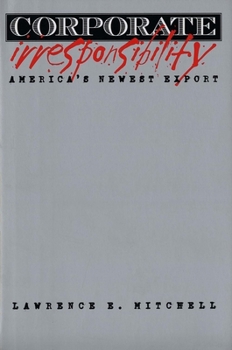Corporate Irresponsibility: America's Newest Export
Corporations are often so focused on making short-term profits for their stockholders that they behave in ways that adversely affect their employees, the environment, consumers, American politics, and even the long-term well-being of the corporation, says Lawrence Mitchell in this provocative book. This is a significant issue not only in the United States but also in the world, for many countries are beginning to emulate the American model of corporate...
Format:Hardcover
Language:English
ISBN:0300090234
ISBN13:9780300090239
Release Date:November 2001
Publisher:Yale University Press
Length:314 Pages
Weight:1.10 lbs.
Dimensions:1.1" x 5.9" x 8.6"
Customer Reviews
3 ratings
Profit Without Honor
Published by Thriftbooks.com User , 14 years ago
Corporate Irresponsibility was probably destined never to be a popular book from the day it was written in 2001. Not only did it run counter to American business orthodoxy, but it takes a self-consciously scholarly approach from the outset. Any book the first third of which is devoted to a Kantian analysis of the deontological justification of the corporate form is unlikely to garner a wide audience outside academia. This is a shame, because this book is a thoughtful exploration of deep rooted flaws in American corporate law and practice, flaws which are considerably more apparent now than when the book appeared. From the outset, Mitchell questions the fiction of corporate personhood, a creation of the Supreme Court in the late nineteenth century that endowed the corporation with the same legal rights as individual persons. Mitchell sees this as a tragic mistake. A corporation possessing all the legal rights of a person may incorrectly be thought to share the motivations, inhibitions, and interests of a natural person. In fact, however, the corporation, particularly in its American form, owes but one loyalty and possesses but one motivation, the maximization of short term profits and stock prices. Mitchell questions the little examined assumption of American culture that short term profit and societal benefit are coterminous, formerly expressed inthe notorious comment that what is good for General Motors is good for the country. (Not such a popular sentiment since the recent collapse of GM.) In fact, an exclusive focus on short term stock price not only blinds the corporation (and the people to run it) to such obvious externalities as pollution, but also even to the financial decisions that would be in the best interest of the corporation and its stockholders, much less employees, customers, and the public. One example (mine, not Mitchell's) might be the Walt Disney Corporation's relentless pursuit of extension of the copyright term in order to protect its proprietary interest in Mickey Mouse. It has long been recognized, and is acknowledged in the United States Constitution, that copyright is an appropriate temporary measure to ensure that artists and writers are compensated for their work and encouraged to produce more of it. In general, however, works should pass into the public domain as soon as possible so that ideas will be widely disseminated and older works can inspire new ones. (Shakespeare might never have written a line if he had been subjected to a rigorous enforcement of today's copyright laws. The author of the ur-Hamlet would no doubt have sued!) An individual artist only needs to have an artificial monopoly on his creative work for the duration of his lifetime, or perhaps a little longer to provide for his children. This is consistent with the principle of limited copyright, and flesh and blood is likely to demand little more. Only the corporation, which exists in perpetuity, or until dissolution do us part,
Superb.
Published by Thriftbooks.com User , 22 years ago
The way Mitchell breaks down the corporate system in America today is outstanding. The way it practically predicts Enron is eventfully precise. His view for the future is one that is intricately complex, but at the same time simply logical. Great reading for those who are already knowledgeable about the subject or those newly acquainted with it.
Lawyer-Author-Reformist: Double Oxymoron Overturned
Published by Thriftbooks.com User , 22 years ago
I just realized this is the third book by a lawyer I have absorbed in this month's reading, and that is somehow a scary thought. If lawyers are starting to write popular reformist tracts against unfettered capitalism and the export of the flawed U.S. approach to capitalism, something very interesting must be happening in the dark recesses of our national mind.This is not an easy book to read but on balance it is a very important book and one that would appear to be essential to any discussion of how we might reform the relationship between the federal government with its 1950's concepts and regulations, corporations with their secularist and short-term profit and liquidation notions, and the people who ultimately are both the foundation and the beneficiaries (or losers) within the political economy of the nation and the world.The author lays out, from a business law perspective, all the legal and financial reasons why our corporate practices today sacrifice the long-term perspective and the creation of aggregate value, in favor of short-term profit-taking. He makes a number of suggestions for improvement.Toward the end of the book, citing Lipsett but adding his own observations, he digs deep and summarizes our corporate culture as one that threatens traditional forms of community and morality (Lipsett), while increasingly dominating--undermining--foreign governments and cultures. Elsewhere in the book the stunning failure of our form of capitalism in selected countries is explored.Although there are adequate notes, there is no bibliography and the index is extraordinarily mediocre--not containing, for example, the references in the book to oversight, political, or regulation. One star is deducted for this failure by the publisher to treat the book's content seriously.





